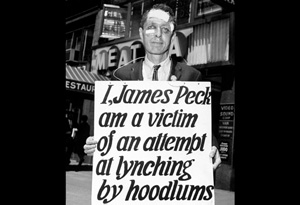Issues Facing America: The '60s

Photo: Getty Images
PAGE 2
Slow Progress
During the first half of the 20th century, the National Association for the Advancement of Colored People (NAACP) and other organizations employed a variety of courtroom strategies to chip away at state and municipal Jim Crow laws mandating racial segregation. These legal maneuvers achieved important victories, such as Morgan v. Commonwealth of Virginia (1946), in which the Supreme Court struck down segregated seating on interstate buses as a violation of the interstate commerce clause.
With state governments bent on preserving a white supremacist system and a federal government eager to hold onto white southern votes, these legal victories did little to change the immediate reality of daily life for African-Americans in the segregated South. However, over time these legal challenges provided the framework for overturning the apparatus of segregation. Legal victories also gave nonviolent activists greater moral authority in their confrontations with segregationists. In campaigns such as the 1947 Journey of Reconciliation and the 1961 Freedom Rides, activists could proclaim that they were simply exercising their constitutional rights, even as local authorities carted them off to jail.
The finding of Plessy v. Ferguson, in which the U.S. Supreme Court established the "separate but equal" doctrine, was not fully overturned for 58 years—until 1954, when Brown v. Board of Education declared the segregation of public schools unconstitutional. Token school desegregation occurred in Little Rock, Arkansas, and other parts of the South, but the pace of change was slow. Many Jim Crow laws remained on the books and were vigorously enforced well into the 1960s. The system would not be officially dismantled until after the passage of the Civil Rights Act of 1964 and the Voting Rights Act of 1965 overturned state Jim Crow laws. This far-reaching federal legislation was prompted by the actions of the Freedom Riders and other direct-action campaigns in the civil rights movement, but it could not have happened without the series of victories won in the courts during earlier decades.
During the first half of the 20th century, the National Association for the Advancement of Colored People (NAACP) and other organizations employed a variety of courtroom strategies to chip away at state and municipal Jim Crow laws mandating racial segregation. These legal maneuvers achieved important victories, such as Morgan v. Commonwealth of Virginia (1946), in which the Supreme Court struck down segregated seating on interstate buses as a violation of the interstate commerce clause.
With state governments bent on preserving a white supremacist system and a federal government eager to hold onto white southern votes, these legal victories did little to change the immediate reality of daily life for African-Americans in the segregated South. However, over time these legal challenges provided the framework for overturning the apparatus of segregation. Legal victories also gave nonviolent activists greater moral authority in their confrontations with segregationists. In campaigns such as the 1947 Journey of Reconciliation and the 1961 Freedom Rides, activists could proclaim that they were simply exercising their constitutional rights, even as local authorities carted them off to jail.
The finding of Plessy v. Ferguson, in which the U.S. Supreme Court established the "separate but equal" doctrine, was not fully overturned for 58 years—until 1954, when Brown v. Board of Education declared the segregation of public schools unconstitutional. Token school desegregation occurred in Little Rock, Arkansas, and other parts of the South, but the pace of change was slow. Many Jim Crow laws remained on the books and were vigorously enforced well into the 1960s. The system would not be officially dismantled until after the passage of the Civil Rights Act of 1964 and the Voting Rights Act of 1965 overturned state Jim Crow laws. This far-reaching federal legislation was prompted by the actions of the Freedom Riders and other direct-action campaigns in the civil rights movement, but it could not have happened without the series of victories won in the courts during earlier decades.
ONLINE CONTENT COURTESY OF
"FREEDOM RIDERS"
AMERICAN EXPERIENCE, A WGBH PRODUCTION FOR PBS
"FREEDOM RIDERS"
AMERICAN EXPERIENCE, A WGBH PRODUCTION FOR PBS



